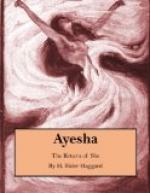“What of it if I do discomfort those who think more of pelf than of courage and of virtue; those who, as that Hebrew prophet wrote, lay field to field and house to house, until the wretched whom they have robbed find no place left whereon to dwell? What if I proved your sagest chapmen fools, and gorge your greedy moneychangers with the gold that they desire until they loathe its very sight and touch? What if I uphold the cause of the poor and the oppressed against the ravening lusts of Mammon? Why, will not this world of yours be happier then?”
“I do not know,” answered Leo. “All that I know is that it would be a different world, one shaped upon a new plan, governed by untried laws and seeking other ends. In so strange a place who can say what might or might not chance?”
“That we shall learn in its season, Leo. Or, rather, if it be against thy wish, we will not turn this hidden page. Since thou dost desire it, that old evil, the love of lucre, shall still hold its mastery upon the earth. Let the peoples keep their yellow king, I’ll not crown another in his place, as I was minded—such as that living Strength thou sawest burning eternally but now; that Power whereof I am the mistress, which can give health to men, or even change the character of metals, and in truth, if I so desire, obedient to my word, destroy a city or rend this Mountain from its roots.
“But see, Holly is wearied with much wondering and needs his rest. Oh, Holly! thou wast born a critic of things done, not a doer of them. I know thy tribe for even in my day the colleges of Alexandria echoed with their wranglings and already the winds blew thick with the dust of their forgotten bones. Holly, I tell thee that at times those who create and act are impatient of such petty doubts and cavillings. Yet fear not, old friend, nor take my anger ill. Already thy heart is gold without alloy, so what need have I to gild thy bones?”
I thanked Ayesha for her compliment, and went to my bed wondering which was real, her kindness or her wrath, or if both were but assumed. Also I wondered in what way she had fallen foul of the critics of Alexandria. Perhaps once she had published a poem or a system of philosophy and been roughly handled by them! It is quite possible, only if Ayesha had ever written poetry I think that it would have endured, like Sappho’s.
In the morning I discovered that whatever else about her might be false, Ayesha was a true chemist, the very greatest, I suppose, who ever lived. For as I dressed myself, those priests whom we had seen in the laboratory, staggered into the room carrying between them a heavy burden, that was covered with a cloth, and, directed by Oros, placed it upon the floor.
“What is that?” I asked of Oros.
“A peace-offering sent by the Hesea,” he said, “with whom, as I am told, you dared to quarrel yesterday.”
Then he withdrew the cloth, and there beneath it shone that great lump of metal which, in the presence of myself and Leo, had been marked with the Symbol of Life, that still appeared upon its surface. Only now it was gold, not iron, gold so good and soft that I could write my name upon it with a nail. My knife lay with it also, and of that too the handle, though not the blade, had been changed from iron into gold.




